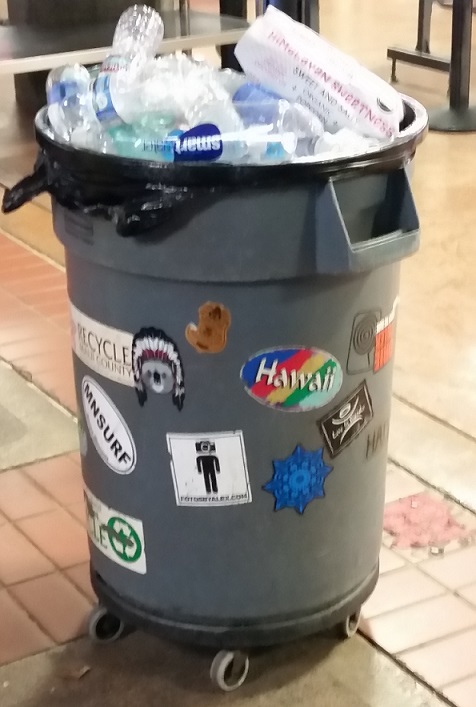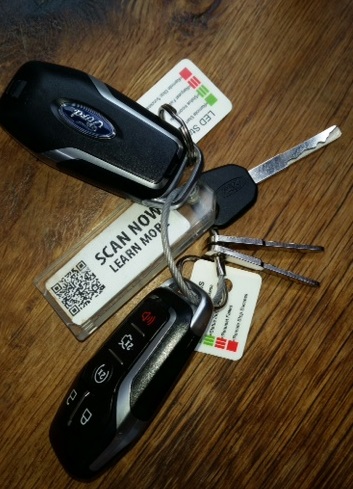Things that make you go hmm.
- How come flight attendants have to pick up the cups they serve drinks in prior to takeoff, but they let me keep the Starbucks coffee I brought on board myself?
- If Delta, United, and American award points as a multiple of the price paid for your ticket, why do they call those points ‘miles’?
- If liquids are so dangerous, why are they tossed together in a bin next to the security checkpoint instead of dealt with by a hazmat team?

- Why don’t airlines who base elite status on revenue give credit for tickets purchased but not flown?
- Why do rental car companies have to cable ALL of a vehicles keys together? If you lose one key this way you lose them all. Whose pocket exactly are these supposed to fit in?

I might as well add, echoing Gallagher, “why do we drive on parkways, and park in driveways?”


I’ve always wondered why it’s called “pre-boarding,” because those people are obviously boarding. Should call it “early boarding,” perhaps.
I like the “Pearls Before Swine” comic strip, which asked a couple of weeks ago why a “Near Miss” isn’t called a “Hit” and a “Near Hit” isn’t called a “Miss”.
The PDB cup thing is a liability issue. If the airline provides the cup and said cup becomes a projectile in an emergency the airline is culpable. The timing of pick up depends on the galley configuration. If there is a waste bin accessible without opening a cart you can keep it longer.. If a cart has to be opened we have to collect before the aircraft can move..
If you bring it yourself it’s your responsibility but the FA should make you stow & secure it.
Re: the “Near Miss”. I also thought that was backwards for a few years ago. I heard someone say (not about aircraft at all) “that was a near thing”. From the Cambridge English Dictionary (per Google), “a near thing” means “a situation in which you almost failed to achieve something and only just succeeded: We beat them but it was a near thing.”
The logic side of my brain caught the parallel – it was a miss, no collision, but it was a “near thing” and barely succeeded in being a miss. Hence, “a near miss”.
Ever since, I’ve been at peace with the term.
Good questions except that for question 1, they are supposed to take your Starbucks cup unless it’s a recyclable one which you should empty and stow for takeoff.
Liquids are not so dangerous but there is a theoretical chance that liquid explosives are brought on the plane by terrorists. That’s why they are banned. Liquids surrendered are almost certainly harmless.
As for miles, it used to be that one mile flown was awarded one mile. Some countries where kilometers are used call it “points” instead of miles. The sweetest year was when there was triple miles. One SFO-JFK round trip in economy got about 15,000 miles. 20,000 miles was needed for a free trip. 50,000 miles was needed for two free trips to Europe in economy, which could be used by one person within a year or two people.
First off, it is my recollection (less perfect every year!) that both the “parkway” and “near miss” jokes were Carlin originals. I suspect you don’t get “miles” (because the reward programs were originally based on miles flown) for unused tickets because: they can. They don’t want to give your miles, really. You’re unlikely to say “I’ll fly X over Y, because if the ticket expires unused, X will give me credit.” If you thought you might need to cancel, you’d likely buy a fully refundable fare. So, too few people lose miles because of the policy to form an angry enough group. If they didn’t cable they Keys together, too many customers would loose a set.
An ever bigger question is why airlines based outside the US award miles. Shouldn’t they award kilometers? And why do European Marriott accounts get points per dollar spend — shouldn’t it be based on Euro spend?
Limited liquids on an airplane as it is, is security theater. There is no scientific basis that one 500 ml container of a liquid fitting in a quart sized bag that meets requirements is more dangerous than 5 100ml containers of the same liquid fitting in a quart sized bag that meets requirements. Purely a way to assert control. Liquids in checked luggage can be of a greater quantity than in carry-on luggage. Must be because more is less dangerous (sarcasm).
Are we just channeling our inner George Carlin on here?
Parkway/Driveway:
Roadway designations used to have guidelines. Like, Boulevard meant multi lanes for either direction with a pathway divider in the middle while Avenue meant just a yellow strip dividing traffic, etc down to road/ … Parkway literally meant a Boulevard with trees/foliage/grass dividing either direction.
Driveway used to mean the literally drive – way from the street to the 35 room mansion that might be set back a mile from the street (where your butler waits for your Dusenberg to roll up to the front door) … as most of us live about 30 feet fro the street now, the driveway got shortened but not the name.
And you can’t hail a taxi on the taxiway, nor can you go for a run on the runway.
Rental car keys are kept with the car, because the car may never return to the same station — the logistical work of having to keep and maintain and distribute all the additional keys when the vehicles leave the fleet would be far too much. Unfortunately that often means two fobs and or two keys with each car!
The rental car keys are cabled together so that both keys stay with the car. If one key is lost, the value of the car goes down when they are traded in or sold to the public as a used car. The side benefit is that if you lose the keys, you lose them both 🙂
Some rental car companies also keep extra OEM items by the spare tire so they can be with the car when resold. Some used to cable the extra key in the trunk in a hidden spot.
Another weird rental car rule is that stickers or advertisements aren’t allowed on the exterior at many locations, like in Florida, due to theft and carjacking concerns. Criminals are known to target rental car customers as they know they might be tourists and have valuables on them as well.
In addition, the rental car insurance products you buy are typically underwritten by large insurance companies like Zurich, where the insurance company receives the bulk of the fee as premiums per day, and the rental car company keeps a percentage as profit for selling that insurance product to the renter. For example, say a rental car coverage is $10 per day, the carrier may get $8, and the car rental company keeps $2. The car rental companies then have premium auditors from the insurance company check their records on an annual or more frequent basis to make sure the accounting is correct.
Re: trash cans of water. TSA installs a rule limiting liquids because bad actors could bring large enough quantities of liquids, that when combined with others brought on the plane, could cause a sufficiently large explosion. It would take too many bad guys on a plane to do it 100ml at a time. TSA confiscates water bottles, knowing every single one has just water, so this casual disposal is no issue. Why is every one just water (or vodka or not part of a plot)? Because, they confiscate them. Bad actors don’t try to sneak them on. Thus, we have a Nash equilibrium: TSA confiscates water bottles and bad actors don’t try to sneak bad liquids through. TSA can’t start to let large liquids through (absent new screening tech) because bad actors would then try to exploit that. Bad actors won’t start trying to sneak them through, because they’ll get caught.
Yup, Dave W gets it about the liquids. It’s one of many situations where the evil actors end up deterred and only innocents are actually caught. That does NOT mean you can get rid of the rule, though!
And the other things around the liquid rule make sense if you pay attention to the big picture.
Taste is ok? Yeah, H2O2 of a high enough purity to be useful to a bad guy will react very badly with your mouth.
Ice is ok? H2O2 liquid looks just like H2O liquid. H2O2 freezes at IIRC -40, though, and that would be apparent.
Now, could the bad guys actually have used H2O2 for evil? By themselves, I doubt it–but sometimes there are highly skilled people providing the equipment the not so smart bombs use. We’ve had an actual case of a chemistry student making a mistake and having to call the bomb squad because he realized he had inadvertently made a beaker of TATP and he didn’t want to handle it (it’s prone to detonating with minor provocation) to deal with it.